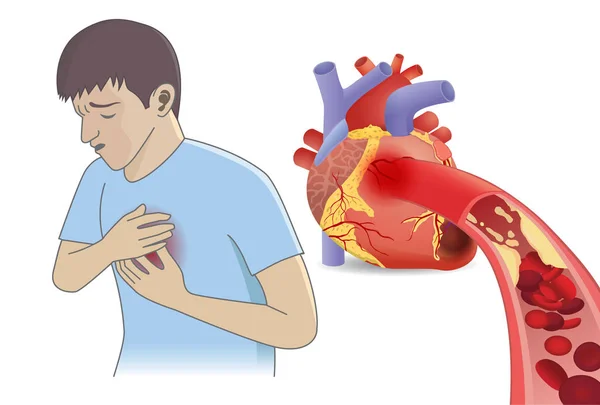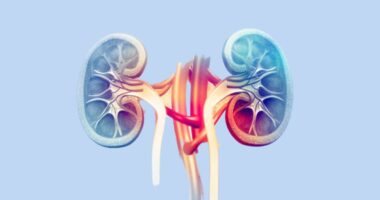This Protein Predicts Heart Attack Risk Better, In recent years, the medical community has increasingly scrutinized traditional markers of cardiovascular health, particularly cholesterol levels. New research indicates that high-sensitivity C-reactive protein (hsCRP) may be a more reliable predictor of heart attack and stroke risk, especially in women. This shift in focus could redefine how we assess cardiovascular health and tailor preventive strategies.

What Is High Cholesterol?
High cholesterol is a condition characterized by elevated levels of cholesterol in the blood. Cholesterol is a waxy, fat-like substance that is essential for various bodily functions, such as building cell membranes and producing hormones. However, when there is too much cholesterol in the blood, it can lead to serious health problems. There are two main types of cholesterol:
- Low-density lipoprotein (LDL): Often referred to as “bad” cholesterol, LDL can build up on the walls of the arteries, causing them to narrow and harden, a condition known as atherosclerosis. This increases the risk of heart attacks and strokes.
- High-density lipoprotein (HDL): Known as “good” cholesterol, HDL helps remove LDL cholesterol from the arteries and transports it back to the liver for disposal or reuse.

High cholesterol is usually caused by a combination of factors, including:
- Unhealthy diet: Eating foods high in saturated and trans fats can raise LDL levels.
- Lack of exercise: Regular physical activity helps raise HDL levels and lowers LDL.
- Obesity: Being overweight or obese increases the risk of high cholesterol.
- Genetics: Some people inherit genes that cause them to produce too much LDL cholesterol.
- Age and gender: Cholesterol levels tend to rise as people get older. Before menopause, women tend to have lower LDL levels than men of the same age.
- Certain medical conditions: Diseases like diabetes and hypothyroidism can contribute to high cholesterol.
- Certain medications: Some drugs, such as certain blood pressure medications and corticosteroids, can raise cholesterol levels.
High cholesterol usually has no symptoms, but it can be detected through a simple blood test called a lipid panel or lipid profile. This test measures the levels of LDL, HDL, and total cholesterol in the blood. According to the American Heart Association, the following cholesterol levels are considered optimal for most adults:
- Total cholesterol: Less than 200 mg/dL
- LDL cholesterol: Less than 100 mg/dL
- HDL cholesterol: 60 mg/dL or higher
If cholesterol levels are high, treatment typically involves lifestyle changes, such as adopting a healthy diet, exercising regularly, and maintaining a healthy weight. In some cases, medication may be necessary to lower cholesterol levels and reduce the risk of heart disease and stroke.
Understanding High-Sensitivity C-Reactive Protein (hsCRP)
High-sensitivity C-reactive protein is a protein produced by the liver in response to inflammation. The hsCRP test measures the levels of this protein in the blood, providing insight into systemic inflammation that can affect cardiovascular health. Elevated hsCRP levels are linked to an increased risk of heart disease, making it a valuable tool in assessing cardiovascular risk.
What Does the hsCRP Test Measure?
The hsCRP test is highly sensitive and can detect low levels of CRP, ranging from 0.3 to 10 mg/L. According to the Centers for Disease Control and Prevention (CDC), hsCRP levels can be categorized as follows:
- Low risk: Less than 1 mg/L
- Moderate risk: 1 to 3 mg/L
- High risk: Greater than 3 mg/L.
These categories help healthcare providers stratify patients based on their risk for cardiovascular events, including heart attacks and strokes.
New Study Reveals Hidden Protein as Key Heart Attack Indicator
High-sensitivity C-reactive protein is a protein produced by the liver in response to inflammation. Elevated levels of hsCRP in the blood can indicate systemic inflammation, which is a known risk factor for cardiovascular diseases. Unlike cholesterol, which is primarily associated with plaque buildup in arteries, hsCRP serves as a marker for inflammation that can damage blood vessels and lead to heart attacks and strokes. The significance of hsCRP lies in its ability to provide a broader picture of cardiovascular health. A study published in the Journal of the American College of Cardiology found that women with high hsCRP levels had a 70% greater risk of experiencing a major cardiovascular event compared to those with lower levels, regardless of their cholesterol readings. This finding challenges the long-held belief that cholesterol is the primary driver of heart disease risk.
Cholesterol vs. hsCRP: A Comparative Analysis
- Traditional Risk Assessment: For decades, healthcare providers have relied on cholesterol levels as a primary tool for assessing cardiovascular risk. High levels of low-density lipoprotein (LDL) cholesterol, often termed “bad” cholesterol, have been linked to plaque formation in arteries and subsequent cardiovascular events.
- Emerging Evidence for hsCRP: The recent study indicates that hsCRP may provide more relevant information about cardiovascular risk, particularly in women. Inflammation, as indicated by elevated hsCRP levels, can lead to arterial damage and plaque buildup, even in individuals with normal cholesterol levels.
- Clinical Implications: The findings suggest that healthcare providers should consider incorporating hsCRP testing into routine cardiovascular risk assessments. This could lead to earlier identification of at-risk individuals and more effective preventive measures.
The Study’s Findings
The study conducted by researchers at Brigham and Women’s Hospital in Boston involved a large cohort of women and highlighted several key points:
- Elevated hsCRP Levels: Women with high hsCRP levels were found to have a significantly increased risk of heart attacks and strokes, independent of their cholesterol levels. This suggests that hsCRP is a valuable biomarker for assessing cardiovascular risk.
- Broader Implications for Women’s Health: The research underscores the importance of understanding cardiovascular risk factors specific to women. Traditional risk assessments have often overlooked the unique aspects of women’s health, leading to potential underdiagnosis and undertreatment of cardiovascular conditions.
- Potential for Improved Screening: By integrating hsCRP testing into routine screenings, healthcare providers can better stratify risk and tailor interventions. This approach may lead to improved outcomes for women at risk of cardiovascular disease.
Why hsCRP May Be a Better Predictor
The traditional view has been that high cholesterol levels are a primary driver of heart disease. However, this new research suggests that inflammation, as indicated by hsCRP levels, plays a critical role in the development of cardiovascular diseases. Inflammation can lead to atherosclerosis, a condition characterized by the buildup of plaque in the arteries, which can ultimately result in heart attacks and strokes.
The Role of Inflammation in Cardiovascular Disease
Inflammation is a natural response of the body to injury or infection, but chronic inflammation can be detrimental. Elevated hsCRP levels indicate ongoing inflammation, which can damage blood vessels and promote plaque formation. This connection underscores the importance of monitoring hsCRP levels as part of a comprehensive cardiovascular risk assessment.
Implications for Heart Health Screening
The implications of these findings are profound. If hsCRP is indeed a more accurate predictor of cardiovascular risk, healthcare providers may need to revise their screening protocols. Instead of focusing solely on cholesterol levels, incorporating hsCRP testing could lead to earlier identification of at-risk individuals and more effective preventive measures.
Integrating hsCRP into Risk Assessment
The integration of hsCRP into cardiovascular risk assessment models can enhance risk stratification. For instance, the Reynolds Risk Score incorporates hsCRP levels alongside traditional risk factors, offering a more nuanced view of an individual’s risk profile. This approach allows for tailored interventions, including lifestyle modifications and medical treatments aimed at reducing inflammation and improving heart health.
Lifestyle Factors and hsCRP Levels
Several lifestyle factors can influence hsCRP levels, including:
- Diet: A diet high in refined carbohydrates and unhealthy fats can exacerbate inflammation.
- Physical Activity: Regular exercise is associated with lower hsCRP levels.
- Weight Management: Obesity is linked to higher levels of inflammation and hsCRP.
- Smoking: Tobacco use increases inflammation and hsCRP levels.
By addressing these factors, individuals can potentially lower their hsCRP levels and reduce their risk of cardiovascular disease.
Final Thoughts
The emerging evidence surrounding hsCRP as a key indicator of cardiovascular risk represents a significant shift in our understanding of heart health. As research continues to evolve, it is essential for both healthcare providers and patients to recognize the importance of inflammation in cardiovascular disease.
By prioritizing hsCRP testing alongside traditional cholesterol assessments, we can better identify individuals at risk and implement targeted prevention strategies. This holistic approach to cardiovascular health may ultimately lead to improved outcomes and a reduction in heart disease prevalence.
In light of these findings, it is crucial for individuals, especially women, to engage in discussions with their healthcare providers about their cardiovascular risk factors, including hsCRP levels. Early intervention and lifestyle changes can make a significant difference in heart health, paving the way for a healthier future.
Also Read | High cholesterol: Expert identifies factor linked to excess cholesterol levels









